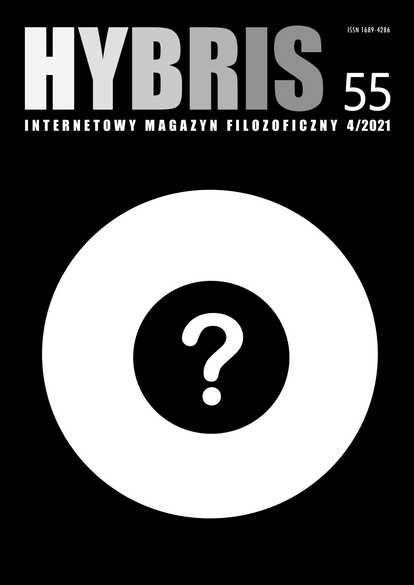Conception of freedom in Friedrich Nietzsche’s philosophy
DOI:
https://doi.org/10.18778/1689-4286.55.02Keywords:
freedom, Overman, philosophy, NietzscheAbstract
The article presents the conception of freedom in Nietzsche's thought in the three periods of his writings. In the first period Nietzsche believe that freedom is connected with estethical-tragic contempletion in the Greek tragedy. He also points out that freedom is culture-forming act in the unity with oneself and with the world. In the second period Nietzsche says that to become truly free is to liberate oneself from the metaphysics and religious tradition. In the third period Nietzsche is convinced that only those who have gived themselves the law which is an expression of their nature are truly free.
References
Baranowska, M. (2014), Nadczłowiek, czyli negacja religijności, Studia Jurydyce Toruniensia, tom XIV, 14-33 https://doi.org/10.12775/SIT.2014.001
View in Google Scholar
DOI: https://doi.org/10.12775/SIT.2014.001
Baranowska, M. (2016),Nietzsche o wolności jednostki, czyli o niespełnionych i spełnionych marzeniach, Roczniki filozoficzne, nr 64 (1), 93-111 https://doi.org/10.18290/rf.2016.64.1-8
View in Google Scholar
DOI: https://doi.org/10.18290/rf.2016.64.1-8
Baranowska, M. (2019),Wola mocy a wolność w filozofii Nietzschego, W: Go recki, Wolność człowieka i jej granice. Antologia pojęcia w doktrynach polityczno-prawnych. Od Nietzschego do współczesności(s. 7-30), Łódź : Wydawnictwo Uniwersytetu Łódzkiego.
View in Google Scholar
Buczyn ska-Garewicz, H. (2013),Czytanie Nietzschego, Kraków: Universitas.
View in Google Scholar
Jaspers, K. (2012), Nietzsche. Wprowadzenie do rozumienia jego filozofii, Łódź : Officyna.
View in Google Scholar
Kuderowicz, Z. (1976), Nietzsche, Warszawa: Wiedza Powszechna
View in Google Scholar
Letkiewicz, S. (2011), Moralność dla wszystkich czy dla każdego?, Katowice: Wydawnictwo Uniwersytetu Śląskiego.
View in Google Scholar
May, S. (2009), Nietzsche and the Free Self, W: Games, K., May, S, Nietzsche on Freedom and Autonomy(s. 89-106), New York: Oxford University Press. https://doi.org/10.1093/acprof:oso/9780199231560.003.0005
View in Google Scholar
DOI: https://doi.org/10.1093/acprof:oso/9780199231560.003.0005
Mcneil, B. E. (2021), Nietzsche and Eternal Recurrence, Switzerland: Palgrave Macmillian. https://doi.org/10.1007/978-3-030-55296-1
View in Google Scholar
DOI: https://doi.org/10.1007/978-3-030-55296-1
Nietzsche, F. (2012), Dzieła wszystkie. t. 1 (Narodziny tragedii, Niewczesne rozważania), Łódź : Officyna.
View in Google Scholar
Nietzsche, F. (2019), Dzieła wszystkie, t. 10 (Notatki z lat 1882-1884), Łódź : Officyna.
View in Google Scholar
Nietzsche, F. (2012a), Dzieła wszystkie, t. 13 (Notatki z lat 1887-1889), Łódź : Officyna.
View in Google Scholar
Nietzsche, F. (2009), Ecce homo. Jak się staje, kim się jest, Warszawa: Aletheia.
View in Google Scholar
Nietzsche, F. (2017), Jutrzenka. Myśli o przesądach moralnych, Kraków: vis-a-vis Etiuda.
View in Google Scholar
Nietzsche, F. (1908), Ludzkie, arcyludzkie, Warszawa: Nakład Jako ba Mortkowicza.
View in Google Scholar
Nietzsche, F. (2011), Nachlass. Pisma z lat 1884-1885, Warszawa: PWN.
View in Google Scholar
Nietzsche, F. (2010), Poza dobrem i złem, Kraków: vis-a-vis Etiuda.
View in Google Scholar
Nietzsche, F. (2008), Radosna wiedza, Gdańsk: Słowo/Obraz Terytoria.
View in Google Scholar
Nietzsche, F. (2006), Tako rzecze Zaratustra, Poznań : Vesper.
View in Google Scholar
Nietzsche, F. (1909), Wędrowiec i jego cień, Warszawa: Nakład Jako ba Mortkowicza.
View in Google Scholar
Nietzsche, F. (2015), Wola mocy, Kraków: vis-a-vis Etiuda.
View in Google Scholar
Nietzsche, F. (2011), Z genealogii moralności, Wydawnictwo Uniwersytetu Jagiellońskiego: Kraków.
View in Google Scholar
Nietzsche, F. (2015a), Zmierzch bożyszcz, czyli jak filozofuje się młotem, Kraków: vis-a-vis Etiuda.
View in Google Scholar
Pałasiński, P. (2016), Pojęcie woli mocy Fryderyka Nietzschego, Rocznik Filozoficzny Ignatianum, nr 22 (1), 254-269.
View in Google Scholar
Pippin, R. (2009), How to Overcome Oneself, W: Games, K., May, S, Nietzsche on Freedom and Autonomy, (s. 69-87), New York: Oxford University Press. https://doi.org/10.1093/acprof:oso/9780199231560.003.0004
View in Google Scholar
DOI: https://doi.org/10.1093/acprof:oso/9780199231560.003.0004
Scheler, M. (1987), Pisma z antropologii filozoficznej i teorii wiedzy, PWN: Warszawa.
View in Google Scholar
Wiśniewska, W. (2006), Fryderyka Nietzschego krytyka wykształcenia niemieckiego: (na podstawie eseju F. Nietzschego "Dawid Strauss jako wyznawca i pisarz"), Studia Philosophiae Christianae, nr 42 (1), 192-204.
View in Google Scholar
Zdybicka, Z. (2012), Problem ateizmu, Polskie Towarzystwo Tomasza z Akwinu: Lublin.
View in Google Scholar
Downloads
Published
How to Cite
Issue
Section
License

This work is licensed under a Creative Commons Attribution-NonCommercial-NoDerivatives 3.0 Unported License.






